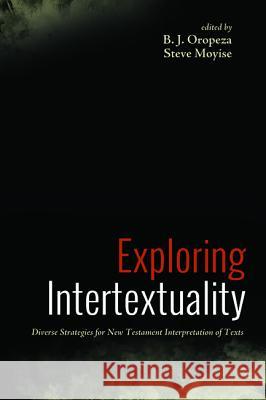Exploring Intertextuality » książka
Exploring Intertextuality
ISBN-13: 9781498223119 / Angielski / Miękka / 2016 / 346 str.
Exploring Intertextuality
ISBN-13: 9781498223119 / Angielski / Miękka / 2016 / 346 str.
(netto: 152,04 VAT: 5%)
Najniższa cena z 30 dni: 159,20
ok. 16-18 dni roboczych.
Darmowa dostawa!
This book aims to provide advanced students of biblical studies, seminarians, and academicians with a variety of intertextual strategies to New Testament interpretation. Each chapter is written by a New Testament scholar who provides an established or avant-garde strategy in which: 1) The authors in their respective chapters start with an explanation of the particular intertextual approach they use. Important terms and concepts relevant to the approach are defined, and scholarly proponents or precursors are discussed. 2) The authors use their respective intertextual strategy on a sample text or texts from the New Testament, whether from the Gospels, Acts, Pauline epistles, Disputed Pauline epistles, General epistles, or Revelation. 3) The authors show how their approach enlightens or otherwise brings the text into sharper relief. 4) They end with recommended readings for further study on the respective intertextual approach. This book is unique in providing a variety of strategies related to biblical interpretation through the lens of intertextuality. ""Just when you think you understand intertextuality, a volume like this comes along that reveals just how much you have yet to learn This is an amazing array of essays that relate intertextuality to many other methods and perspectives, from semiotics to sociorhetorical, midrash to mimesis.This collection clearly explains and carefully illustrates--using sample texts--all that intertextuality has to offer the biblical interpreter. It pushes the boundaries of our understanding in many directions you will want to explore."" --Duane F. Watson, Professor of New Testament Studies, Malone University ""Truly an abundant feast for anyone from general reader to advanced scholar. A deeply savored display of intertextuality from traditional and nontraditional literary approaches to twenty-first-century strategies that negotiate rhetoric, linguistics, orality, and post-structuralism. A rich menu of clear definition and discussion of key theoretical reasoning fortified with well-developed interpretation of specific texts. Rare indeed will be persons who feel there was nothing on the menu for them in this volume."" -- Vernon K. Robbins, Professor of New Testament and Comparative Sacred Texts, Emory University B. J. Oropeza (PhD, University of Durham) is the founder of the Intertextuality in the New Testament Section of the Society of Biblical Literature. He is Professor of Biblical and Religious Studies at Azusa Pacific University and is an internationally published author whose many works include the subjects of Pauline studies, Corinthian correspondence, intertextuality, sociorhetorical criticism, and a three-volume monograph series titled Apostasy in the New Testament Communities. He is a member of the Rhetoric of Religious Antiquity. Steve Moyise is Visiting Professor at Newman University, Birmingham, UK, and author of Was the Birth of Jesus according to Scripture? (Cascade, 2013); the trilogy Paul and Scripture, Jesus and Scripture, and The Later New Testament Writings and Scripture (2010-12); and Evoking Scripture: Hearing the Old Testament in the New (2008)."
This book aims to provide advanced students of biblical studies, seminarians, and academicians with a variety of intertextual strategies to New Testament interpretation. Each chapter is written by a New Testament scholar who provides an established or avant-garde strategy in which:1) The authors in their respective chapters start with an explanation of the particular intertextual approach they use. Important terms and concepts relevant to the approach are defined, and scholarly proponents or precursors are discussed.2) The authors use their respective intertextual strategy on a sample text or texts from the New Testament, whether from the Gospels, Acts, Pauline epistles, Disputed Pauline epistles, General epistles, or Revelation.3) The authors show how their approach enlightens or otherwise brings the text into sharper relief.4) They end with recommended readings for further study on the respective intertextual approach.This book is unique in providing a variety of strategies related to biblical interpretation through the lens of intertextuality.""Just when you think you understand intertextuality, a volume like this comes along that reveals just how much you have yet to learn! This is an amazing array of essays that relate intertextuality to many other methods and perspectives, from semiotics to sociorhetorical, midrash to mimesis. This collection clearly explains and carefully illustrates--using sample texts--all that intertextuality has to offer the biblical interpreter. It pushes the boundaries of our understanding in many directions you will want to explore."" --Duane F. Watson, Professor of New Testament Studies, Malone University ""Truly an abundant feast for anyone from general reader to advanced scholar. A deeply savored display of intertextuality from traditional and nontraditional literary approaches to twenty-first-century strategies that negotiate rhetoric, linguistics, orality, and post-structuralism. A rich menu of clear definition and discussion of key theoretical reasoning fortified with well-developed interpretation of specific texts. Rare indeed will be persons who feel there was nothing on the menu for them in this volume."" -- Vernon K. Robbins, Professor of New Testament and Comparative Sacred Texts, Emory UniversityB. J. Oropeza (PhD, University of Durham) is the founder of the Intertextuality in the New Testament Section of the Society of Biblical Literature. He is Professor of Biblical and Religious Studies at Azusa Pacific University and is an internationally published author whose many works include the subjects of Pauline studies, Corinthian correspondence, intertextuality, sociorhetorical criticism, and a three-volume monograph series titled Apostasy in the New Testament Communities. He is a member of the Rhetoric of Religious Antiquity. Steve Moyise is Visiting Professor at Newman University, Birmingham, UK, and author of Was the Birth of Jesus according to Scripture? (Cascade, 2013); the trilogy Paul and Scripture, Jesus and Scripture, and The Later New Testament Writings and Scripture (2010-12); and Evoking Scripture: Hearing the Old Testament in the New (2008).











